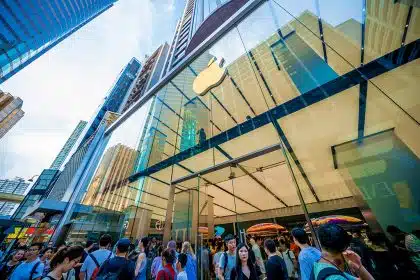The market cap of Apple is currently less than $2 trillion following supply chain headwinds in December caused by COVID in China.
The market cap of Apple (NASDAQ: AAPL) sank below $2 trillion on Tuesday for the first time since May last year. This plunge happened as the tech giant’s shares fell by more than 3% during yesterday’s intraday trading. On Tuesday, Apple’s stock sank 3.74% to $130.20 per share, which now gives the multinational tech company a $1.99 trillion valuation. As of press time, its shares were changing hands at $125.07. This relatively restrained figure also represents a 52-week low for the company.
Following the stock slide, Apple became the last big company to surrender its $2 trillion valuation. Fellow tech giant Microsoft (NASDAQ: MSFT) also previously hit the $2 trillion mark but receded last year.
Apple First Hit $2 Trillion Valuation in 2020 During Covid Spell
Apple initially hit a $2 trillion valuation back in 2020. This came after the California-based company experienced a surge in sales of remote work and school products during the pandemic. Apple’s rise in value continued well into 2021, with the tech company hitting $3 trillion in January 2022.
However, since then, Apple has been caught in the nasty tech sell-off that characterized much of last year. In addition, the consumer electronics and software services company has also weathered surging interest rates and waning consumer confidence. According to investors, these macroeconomic constraints could further hamper demand for Apple’s premium-priced products.
December Supply Chain Constraints
During the holiday season, Apple struggled with iPhone 14 Pro shipments due to Covid restrictions on its China-based primary factory. At the time, the company’s CFO, Luca Maestri, remained dogged in Apple’s abilities to navigate these headwinds successfully. According to Maestri:
“We continued to invest in our long-term growth plans, generated over $24 billion in operating cash flow, and returned over $29 billion to our shareholders during the quarter….”
According to a recent report from supply chain analyst Trendforce, Apple’s iPhone shipments declined a massive 22% during the December quarter. The Trendforce report also stated that iPhone shipments could drop by more than 20% year-over-year (YoY) for the first quarter of 2023. This projected slide is due to the labor shortage in China loosening pandemic-related restrictions.
Meanwhile, according to a Nikkei report, Apple has instructed suppliers to build fewer components for its products in Q1 2023. These products include Macbook laptops, Airpods, and Apple Watch. A manager at an Apple supplying unit touched on the development, saying:
“Apple has alerted us to lower orders for almost all product lines actually since the quarter ending December, partly because the demand is not that strong. The supply chain in China is still trying to cope with the latest abrupt policy turns, which brought a shortage of laborers because of the sharp COVID surges.”
Amid Apple’s latest stock downturn, the broader market was also down on Tuesday. For instance, the S&P 500 index dipped nearly under 1% during the extended trading session. Last year, Apple underperformed the S&P 500 after seeing its share price plummet by approximately 27%. By contrast, the S&P declined more than 18% in 2022.
Tolu is a cryptocurrency and blockchain enthusiast based in Lagos. He likes to demystify crypto stories to the bare basics so that anyone anywhere can understand without too much background knowledge.
When he’s not neck-deep in crypto stories, Tolu enjoys music, loves to sing and is an avid movie lover.



